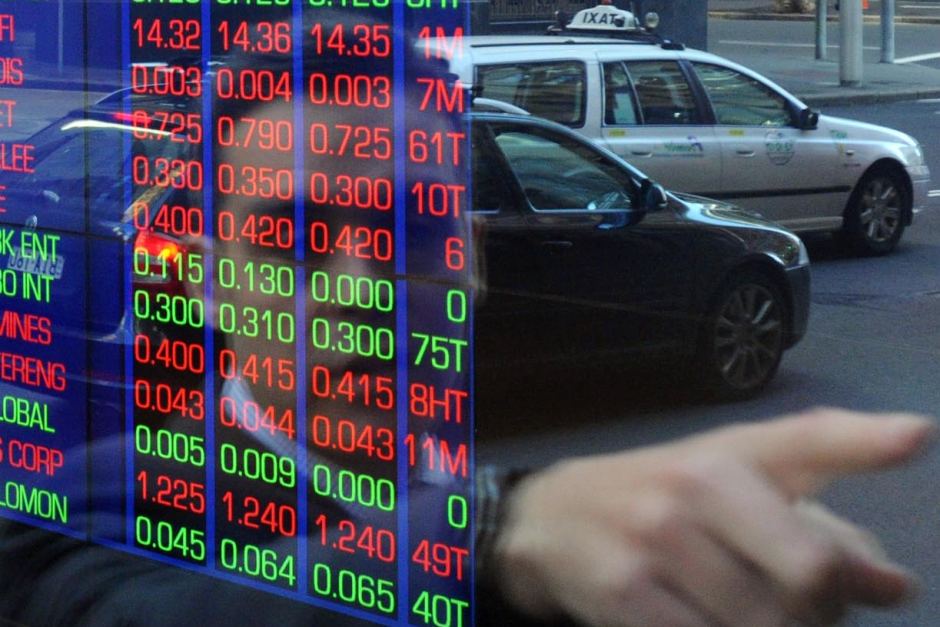Category: Business, Economics and Finance / Stockmarket / Currency / Money and Monetary Policy / Federal Elections / Federal Government / Federal Parliament
Bank shares lead market falls amid election uncertainty
Monday, 4 Jul 2016 08:37:38 | Michael Janda

Investors watch the share price monitors through the window as stocks tumble on the Australian Stock Exchange (ASX) in Sydney on August 8, 2011. (AFP: Torsten Blackwood)
For financial markets already riled by the prospect of Britain leaving the eurozone made real, an increasingly likely hung parliament in Australia is another blow to confidence.
Key points:
- ASX 200 index down 0.3pc shortly after open
- Australian dollar loses around half a cent on election uncertainty
- Analysts say chances of an August interest rate cut have increased
In early trade, the Australian share market itself appears hung, split between losses and gains.
Overall, steep falls for the major banks - no doubt partly on the now increasingly likely prospect of a bank royal commission - had pulled the major indices just into the red.
The ASX 200 index was off 0.3 per cent to 5,231, with the broader All Ordinaries fared a tad better, down 0.2 per cent.
The big four banks were the big losers, sliding between 1.2 and 1.5 per cent, as the stronger-than-expected Labor performance and rise of minor parties increases the chance a royal commission into the sector will be called.
Offsetting those falls were gains for the major miners, beneficiaries of a lower Australian dollar, and very strong gains for gold miners, with Newcrest up more than 3 per cent, as investors keep looking for safe havens.
However, many experts expect any market move to be modest and short-lived.
"The last time Australia had a hung parliament in 2010, the initial 2.5 per cent fall in equity prices and the 1 per cent decline in the dollar were reversed within a week," noted analysts at Capital Economics.
"In other words, it doesn't take the markets long to regain their composure and realise that the economic fundamentals have not changed much."
This time around, the Australian dollar at one stage this morning had lost more than half a cent, but since edged back up to 74.65 US cents by 10:15am (AEST).
Election outcome 'increases the risk' of credit downgrade
A short term consequence if neither major party manages to form a government in its own right is the prospect of Australia's credit rating being placed on "negative watch".
This is a step that ratings agencies take ahead of a possible downgrade - a formal shot across the bows to warn institutions to get their financial act together.
The reasoning behind a possible downgrade would be that a minority government, of either political persuasion, is unlikely to be able to get the sort of spending cuts or tax increases needed to improve the budget through a fractured parliament.
"The uncertainty around the election does, I think, increase the risk that the credit rate agencies lose patience and we will see a downgrade, certainly makes it more likely in the months ahead," said Colonial First State's head of economic and market research Stephen Halmarick.
While both major parties have been in rare agreement on the importance of maintaining Australia's top credit rating, Mr Halmarick said that importance is overstated.
"There are not many AAA credit rating nations left in the world - the UK lost theirs last week - and so, even if Australia was downgraded, I don't think it is going to have a big impact on increasing our borrowing costs because, although our interest rates feel like they are very, very low - they're in fact at historic lows - [they're] still quite a bit higher than the rest of the world," he observed.
"So there is attractiveness of Australian interest rates for global investors."
The analysts at Capital Economics point out that the UK's loss of its top credit rating did not prevent the cost of its borrowing falling to a record low 0.9 per cent.
Election could tip the Reserve Bank towards another cut
However, those interest rates look likely to fall even lower, with the Reserve Bank now widely tipped to take another 25 basis points off the cash rate either tomorrow or, more likely, in August.
"Uncertainty over the political outcome, less business investment, maybe some slippage in the budget, just means I think the Reserve Bank has to do more of the heavy lifting of trying to support the economy and that makes another rate cut more likely," explained Mr Halmarick.
"We are expecting a rate cut in August following what with think will be a low CPI [inflation] reading at the end of the month."
Financial markets are pricing in a nearly 60 per cent chance that the Reserve Bank will cut interest rates by August, but only a 13 per cent chance that the cut will come tomorrow.
Capital Economics is forecasting that Australia's official cash rate will fall as low as 1 per cent next year, but traders are still betting on that as a low probability, little higher than one-in-10.
- About Us
- |
- Terms of Use
- |
-
 RSS
RSS - |
- Privacy Policy
- |
- Contact Us
- |
- Shanghai Call Center: 962288
- |
- Tip-off hotline: 52920043
- 沪ICP证:沪ICP备05050403号-1
- |
- 互联网新闻信息服务许可证:31120180004
- |
- 网络视听许可证:0909346
- |
- 广播电视节目制作许可证:沪字第354号
- |
- 增值电信业务经营许可证:沪B2-20120012
Copyright © 1999- Shanghai Daily. All rights reserved.Preferably viewed with Internet Explorer 8 or newer browsers.




 Send to Kindle
Send to Kindle